- Home
- Susan Hill
The Travelling Bag Page 7
The Travelling Bag Read online
Page 7
I was at my desk when the others came in. Alice Baker slipped into her place as usual, without speaking to anyone. And that would have been that, had it not been for the tea trolley. Two different women shared the trolley run, and this morning it was Avril, the cheerful, chattier one. The trolley stopped and office doors opened, people fetched purses, there was the usual hum of eleven o’clock and the smell of the tea urn drifting along the corridor. But as I got near, alongside Ann, whose desk was next to mine, there was a shriek and we saw that Avril was standing back, hand on her heart, face white. She was making little soft panicky noises in her throat.
When she had been calmed down and someone was making her a sugary tea, she managed to say that she had bent to pick up a bag of teacakes from the bottom of the trolley, and as she had done so, her hand seemed to go right through it, to a spongy, clinging mass inside. It was slimy, she said, cold and damp and also moving about somehow, like yeast proving or the seething scum on the surface of a stagnant pond. Various helpful explanations were offered. The bag was an old one, which had been overlooked and left there for days. In that case, someone else pointed out, the buns would have been stale and very dry.
Mice had got into the bag. In that case, the buns would have been crumbly, with holes in them. I noticed that Alice was standing to one side and very still, just watching. An accounts clerk was bending over the trolley and lifting up the bag of buns from the bottom. As they came into sight people shrank back slightly, not catching one another’s eye. The bag was opened and the teacakes tipped out. They were fresh, plump, nicely browned on top, with a shiny glaze.
‘There must be another bag down there then.’ The accounts clerk searched all three shelves of the trolley, and then opened the door of the metal cupboard and looked inside. Unopened packs of plastic cups and lids. Bags of plastic spoons. A box of wrapped sugar cubes. Nothing else.
By this time, people were restless. Clearly Avril had had some sort of a ‘turn’ – perhaps she had put her hand on the wet cleaning sponge with which she wiped down. She looked tearful and embarrassed although she was still pale, but she pulled herself together and started to pour out teas.
I hung at the back until everybody else had been served and had gone. Avril looked at me.
‘It’s all right,’ I said, ‘You’re not going mad.’
She was making the trolley ready to take up to the next floor and did not look at me.
‘Something did happen,’ I said.
‘As sure as God is my witness.’ Her voice was a whisper and I think the words were meant as much for herself as for me.
‘Don’t worry about it.’
She nodded, and was off, the trolley wheels screeching down the corridor. I have no idea what she was thinking, or how my words, which were meant as some sort of reassurance, might have been taken.
Alice Baker’s head was bent over her work but as I passed, Dilys glanced up. I shrugged. I had decided not to tell her about my visit to the office the previous night. She could become slightly hysterical and the last thing we needed was an atmosphere of vague panic which would spread like a virus and have a dozen people off sick or even giving in their notice. We were short-staffed as it was. More people would come, once we were in the new building, or so we were told every so often – though I think we had all ceased to believe in that.
It was Esther’s birthday on the Friday after the tea trolley incident, and as was our tradition, we all stopped work at three o’clock to present the cake and give our present – in Esther’s case, a new purse. She cut the cake and the slices were handed out on paper plates. We had been gathered round Esther’s desk – all except for Alice Baker, who carried on working, head down, as if nothing else was happening. She ignored her cake.
I don’t know why it was this particular incident that made Dilys lose her temper and it was rather embarrassing when she marched up to Alice’s desk and said ‘If you don’t want that, someone else will be glad to eat it.’
Alice looked up briefly at Dilys, and down again.
‘Don’t you like us? What have we done to deserve you, sulking in your corner? What is wrong with you?’
I put my hand on Dilys’s arm, and Esther said, ‘Never mind, leave it, just leave it,’ and started to clear up the paper plates. But Dilys went on, her voice rising higher and her face going redder as she laid into Alice about how unfriendly, how peculiar, how downright nasty she was.
‘Why did you come here at all? And anyway, where did you come from? I suppose they got sick of you and made your life so unpleasant you had to leave. What happened?’
Alice simply ignored her and carried on working. Dilys had to give up. It was a miserable half hour, and poor Esther, the birthday girl, was in tears.
I had never heard Alice talk about anything to do with her life – family, home, previous jobs – which was unusual. We all talked a lot about our lives outside the office. Alice Baker had been here for several months now and we none of us knew a thing about her.
I woke in the middle of the next night and for some reason I could not get rid of the unpleasant smells and sensations that seemed to be stirred up around Alice Baker, and the overwhelming sense of decay and death I had when she was near. I lay awake for a long time worrying, but I had no explanation and in the end I put it all down to my nerves. I probably needed a tonic.
A whisper went round a month later that several meetings were being held for managers and departmental heads. People scuttled into rooms which had notices pinned on their doors – CONSULTATION IN PROGRESS.
The usual rumours flew round the building, about redundancies and downsizing, made more alarming because no one in the office had any actual facts.
When we arrived for work the following Friday, there was an envelope on every desk. People picked them up, turned them over. Put them down again. Nobody looked at anyone else. It went very quiet.
Alice Baker said, ‘I know what the letters are about.’
Though we saw that hers was still unopened like the rest.
‘We’re moving to new offices in a month’s time. The building is in Chamberlain Street.’
Dilys shot her a look of dislike. Kathleen muttered to me that somebody had a back door into management. I made a big show of ripping open my envelope and unfolding the letter. It was as she had said and it was rather funny how we all managed to make cheerful, optimistic and surprised remarks about the move and ignore Alice Baker and her prior knowledge. She had her head down working as usual, but when I glanced at her sideways just once, I saw a smile hovering on her lips. I could not work out what it meant but I felt it to be unpleasant.
At the end of that afternoon, Dilys and I were packing our things up when she put a hand on my arm to hold me back. Alice Baker was slipping out ahead of us, on her own as usual.
‘I followed her the other day. She never says anything about herself. We’ve no more idea about her home life or where she lives now than when she arrived.’
‘I suppose we don’t have any right to know, really, do we? I think she’s just one of those very private people.’
‘She is weird.’
We started down the stairs. ‘Listen. I followed her up the street. She turned left at the top and crossed the road.’
‘Oh honestly, Dilys, what were you expecting to find out? That’s stalking.’
‘Of course it isn’t.’
‘Well what were you going to do, get on her bus and off at her stop and walk behind her all the way home?’
‘I didn’t get the chance.’
‘Good’
I did not care for Alice Baker and some peculiar things had happened around her, but I thought all this was quite unnecessary.
‘I didn’t get the chance because she crossed the road, but before she got to the opposite pavement, she disappeared.’
‘What, behind a parked car or a waiting bus or something?’
‘No. She just – wasn’t there any more.’
I almost laughed. I would
have laughed, I think, but I saw Dilys’s expression and the laugh did not come. She looked frightened.
‘I mean it,’ she said. ‘I can’t stop thinking about it. I’ve gone over and over what might have happened – I mean, some normal explanation. There’s got to be one, hasn’t there?’
There had, of course, but every one I thought of did not satisfy her, so I made an excuse and said I was going into town, not catching my usual bus.
I did make a doctor’s appointment though, but when I went, everything I had planned to say about nightmares, and hallucinations to do with vile smells and strange lights under the doors of empty rooms and … well, obviously, I could not possibly come out with any of it. Either the doctor would have laughed at me or sent me for psychiatric reports. So I just said I had been feeling a bit overwrought and was sleeping badly. She said I was run-down and recommended a holiday.
And that was that.
The next three weeks were pandemonium. Everything had to be sorted out, rubbish thrown away, necessary paperwork boxed up, our personal desk drawers cleared, things labelled according to a particular system and only that system. There was no time for any daftness or imaginings and Alice Baker worked as hard as the rest of us, though she never chatted. She was very methodical, so we left the labelling system entirely to her and I must say she did it brilliantly. It was uncanny, the way she worked it all out ahead and then just did it, almost as if she had done the whole thing before. She said she understood the layout of the new building and where our section would be and that we would be more open-plan and less a little sealed-off box of our own. She obviously did have access to someone in management and got titbits of information from them, though we never saw her with anyone. But then, she could have been married to the managing director for all we knew.
A few days before we were due to move in, we were all taken on a tour of the new building, section by section. I remember how everyone was rather giggly and fluttering a bit as we walked there in a gang, rather as we had been as children when going to look at ‘big school’. I found myself beside Alice for part of the way. She wore a funny knitted jacket which I thought she must have got in a charity shop because it gave off that not altogether pleasant smell that clothes from those places often do. I was surprised she went to one, to be honest, but then I knew nothing of her personal circumstances. She might have elderly parents or several children to support on her own. I felt rather sad, then, that she did not befriend any of us or join in any of our conversations about home and our family doings. It might have made her seem less odd.
The offices took our breath away. Probably in a year’s time they would have become familiar as our place of everyday work and we would take them for granted, but today, the lightness and brightness of the large rooms, the sense of spaciousness, made us look forward to inhabiting them. I felt a strong sense of release and I realised how long I had worked in the dark, dingy old building and how it must have lowered my spirits, without my even knowing it. Probably all the unpleasantness of the past weeks, all my nightmares and weird imaginings, were a result of a sort of staleness, even a badness, in the cramped rooms, where little daylight ever penetrated.
We worked out the lie of the land in the new place, saw where we would be working and how the new arrangement would apply to each of us. I thought I would not want to be too close to a window, in spite of loving the light airy feel, until someone pointed out that the blinds had not yet been fitted. Nobody was going to have to work in a glare from the sun, and the windows were all double-glazed, to keep out noise and chill. I think every one of us was buoyed up by the visit. We had never really believed the move would happen.
We walked away from the old offices without a backward glance. In my imagination, I bundled together all the unpleasant experiences I had had there in recent weeks, every last thought and sensation and fear and nightmare, and dumped them down the disposal chute. My head felt clear, as if fresh light and air had been let into it. And then, I walked out of the door.
I linked everything that had happened around Alice Baker with the old offices, too. There was nothing very logical about that. It was just that they were so dark and decrepit that they seemed a likely setting for any sort of strangeness. ‘Spooky’ was a word most people had applied to that building at some time or other, though of course we had tried not to talk about it. We had to work there every day.
We were all looking forward to a new start. Yet the moment we had settled in, things got worse. There was a permanent, albeit faint, smell of ancient drains and the closer one got to Alice Baker the stronger the smell, either that one or another, the smell of something that had died a few weeks earlier. I once followed her down the stairs and another bad smell hung about … like rotten eggs. Glances were exchanged but we could not mention it openly, because Alice was always there, head down, working away.
There was a sense of fear too. I began to feel it not just in the office but from the moment I woke, and it increased, until, as I neared the building, I was in a sweat of panic. Several times, I was on the point of fleeing home.
Other people had switched desks or tried to turn their chairs around, and several people who had excellent attendance records had taken sick days.
The terrible sense that the world was decaying around us came and went. Some days were quite normal, the atmosphere was pleasant and fresh. At those times, we all looked out of the big windows frequently, and, if it was not raining, took our breaks outside. Even the waste ground leading down to the canal seemed pleasant.
On one particular day, though, the air inside the office was foul and outside the sky was heavy, with bulbous clouds, tinged yellow. We felt oppressed, and people complained of headaches, as if the barometric pressure had dropped prior to a massive thunderstorm. I kept making typing mistakes, a thing I rarely do. Angela dropped her coffee mug and although the office floor had a rubberised surface, the china still shattered. The photocopier malfunctioned, the lights occasionally flickered, went off and then came on again. There was a peculiar sensation beneath our feet, a warmth, as if the office had underfloor heating. But it did not, and in any case this was August. The warmth seemed to buzz, too, if that does not sound unduly peculiar.
We had a meeting after another week of this sort of thing, and Yvonne and I were nominated to go and see Personnel.
‘Is this an urgent matter? We’re rather busy.’
‘Yes. It is. Very urgent.’
So they slipped us in and we sat in front of a teenager – though of course she could not have been. She listened, and after a while a smirk came over her face.
‘It is actually not funny. It is extremely disturbing. If you had to work in …’
‘Hold on. I’ll have to have a word with Mrs Kirby.’
So we were moved up to the next level. Mrs Kirby did not smirk, she sat, looking down at her desk, listening carefully.
‘Is that all?’ she said.
I had vowed in advance that I would not be flustered, but somehow her tart manner and expression of disapproval made me go red and I stumbled over my words.
‘Well … yes … really … yes. Isn’t it, well, you know, enough?’
She was silent for a moment, looking at me – not at Yvonne, just at me. Yvonne might as well not have been there at all, actually, because she had not spoken, apart from to say ‘Good Morning’, twice.
‘I think the best I can do is let the construction team know.’
‘The …’
‘They’re on hand for another couple of months, in case we have teething troubles in the new building. And there have been some. It’s most likely a drain.’
‘No, you don’t understand … it isn’t there. I mean, it is ONLY there when she is in the office.’
‘Which must mean all of the time … Miss Baker has a spotless attendance record.’
‘Yes, but…’
She stood up. ‘As I say, the team will come and do an assessment. If there is a drain problem, or something like tha
t, I have every confidence that they will locate it.’
‘And if they don’t?’
‘I am quite sure they will.’
And we were out of the door and the door had closed behind us in that single smooth movement at which people in management always seem expert.
We crept back to our office and gave vague replies to all enquiries. But at the end of that afternoon, Deirdre gestured that I should stay behind and then she handed me a business card. It advertised, in quite discreet wording, the services of a Psychic.
‘I think you should go. I know two people who went and she was very accurate about things she couldn’t possibly have known and couldn’t have guessed. I think this whole thing has gone far enough and nobody seems able to provide an explanation. What do you think?’
‘Will you come with me?’
But she said she couldn’t; such things bothered her. So I rang and made an appointment to go alone.
I was quite nervous. The house was ordinary enough, but there was a strange object in the window and the curtains were drawn. At first I thought the woman who opened the door was a lodger or someone of that sort. I don’t know what I expected a psychic to look like, but certainly not like this, with dyed blonde hair, newly set, and a lot of bright lipstick. She wore a fluffy angora jumper and very high heels, and a lot of gold bracelets and pendants.
The room was half-dark. There was a card table at which she sat, having offered me the chair opposite. No crystal balls or anything like that. She had Tarot cards which she shuffled very fast. At first, she just spread them out and looked at them for a while, but then she said I was to ask her one question to get her started. I didn’t know how to put it but eventually I just said, ‘We – the people in my office and myself – we have a colleague who … we want to know if there’s something funny.’

 Mrs De Winter
Mrs De Winter A Question of Identity
A Question of Identity The Various Haunts of Men
The Various Haunts of Men The Pure in Heart
The Pure in Heart Printer's Devil Court
Printer's Devil Court The Travelling Bag
The Travelling Bag The Risk of Darkness
The Risk of Darkness A Kind Man
A Kind Man Black Sheep
Black Sheep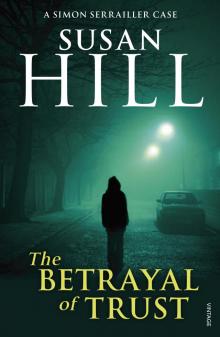 The Betrayal of Trust
The Betrayal of Trust The Service of Clouds
The Service of Clouds Betrayal of Trust
Betrayal of Trust The Small Hand
The Small Hand Dolly
Dolly Jacob's Room Is Full of Books: A Year of Reading
Jacob's Room Is Full of Books: A Year of Reading The Vows of Silence
The Vows of Silence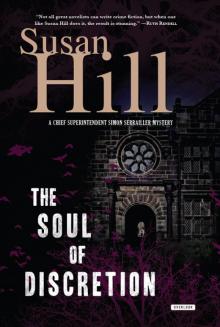 The Soul of Discretion
The Soul of Discretion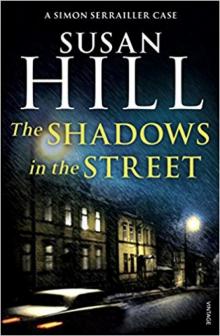 The Shadows in the Street
The Shadows in the Street The Man in the Picture
The Man in the Picture Air and Angels
Air and Angels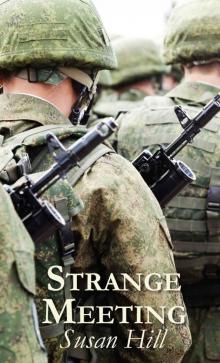 Strange Meeting
Strange Meeting In the Springtime of the Year
In the Springtime of the Year Howards End Is on the Landing: A Year of Reading From Home
Howards End Is on the Landing: A Year of Reading From Home From the Heart
From the Heart Old Haunts
Old Haunts The Mist in the Mirror
The Mist in the Mirror The Woman in Black: A Ghost Story
The Woman in Black: A Ghost Story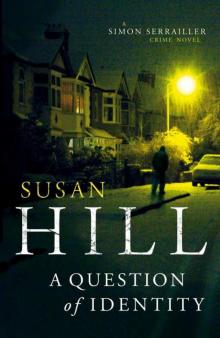 A Question of Identity (Simon Serrailler 7)
A Question of Identity (Simon Serrailler 7) The Comforts of Home
The Comforts of Home Mist in the Mirror
Mist in the Mirror Jacob's Room is Full of Books
Jacob's Room is Full of Books The Woman in Black
The Woman in Black Howards End is on the Landing
Howards End is on the Landing